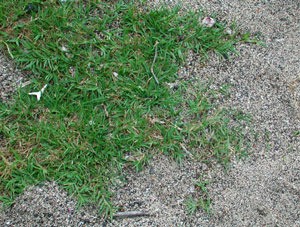Cynodon dactylon
Bermudagrass, Couch grass, Devil's grass, Dog's Tooth Grass, Wiregrass, Scutch Grass, and Common Quickgrass
Bermudagrass (wire grass) is a perennial grassy weed that spreads rapidly by way of creeping underground rhizomes. For years, it has been widely grown as a heavy-duty turf grass or forage grass in moist tropical regions worldwide. Many hybrids have been developed, including varieties adaptable to colder climates. For this reason, Bermudagrass has become a noxious weed in areas where it has been introduced, due to its ability to survive (and thrive) under almost any conditions.
Weeds that re-grow from persistent roots must have their roots dug up. Starting in the center of the plant, use a sharp shovel or spade to loosen the soil in a 10-inch perimeter around the plant. Lift the weed up and out from below, taking as much of the taproot and as many of the smaller root pieces as you can. This method is generally easier to do when the soil around the weed is wet and is necessary for weeds with long taproots.
To effectively control weeds with mulch, you need to apply it thick enough to "take away their sunshine." You can hardly mulch your whole yard, but you can mulch around edgings, under trees and along walkways. Two inches deep is the absolute minimum for effective weed control, or if your using newspaper, you'll need at least 4 to 6 sheets. Avoid using straw, grass clippings or compost, which is likely to contain more weed seeds. Scraps of carpeting or landscaping cloth covered in stones are also effective ways to block out the light.
Organic herbicides containing eugenol (clove oil), citric acid or acetic acid (strong vinegar) have been found to be effective in fighting young weeds. Soap-based herbicides also work well by destroying the cutin layer of the leaves (the layer that seals in moisture), and causes plants to quickly dehydrate and die. Like synthetic herbicides, organic herbicides are not selective and will damage any neighboring plants they come in contact with. Heavy use of acetic acid will also eventually lower your soils pH, making it more acidic. Make sure if you're using organic herbicides, that you apply them on calm days.

About The Author: Ellen Brown is an environmental writer and photographer and the owner of Sustainable Media, an environmental media company that specializes in helping businesses and organizations promote eco-friendly products and services. Contact her on the web at http://www.sustainable-media.com
Add your voice! Click below to comment. ThriftyFun is powered by your wisdom!